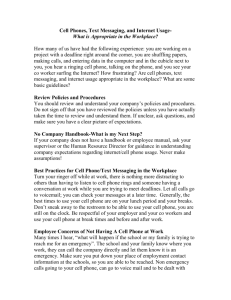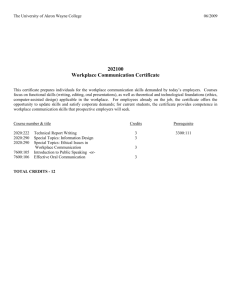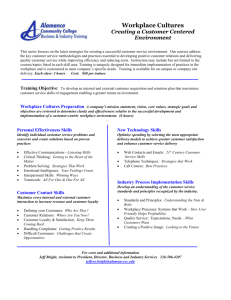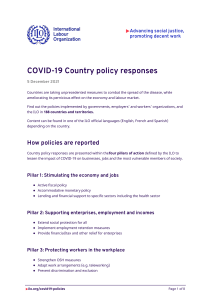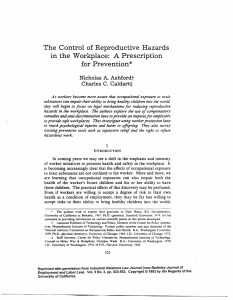speech of ms. lucila tarriela assistant treasurer, employers
advertisement
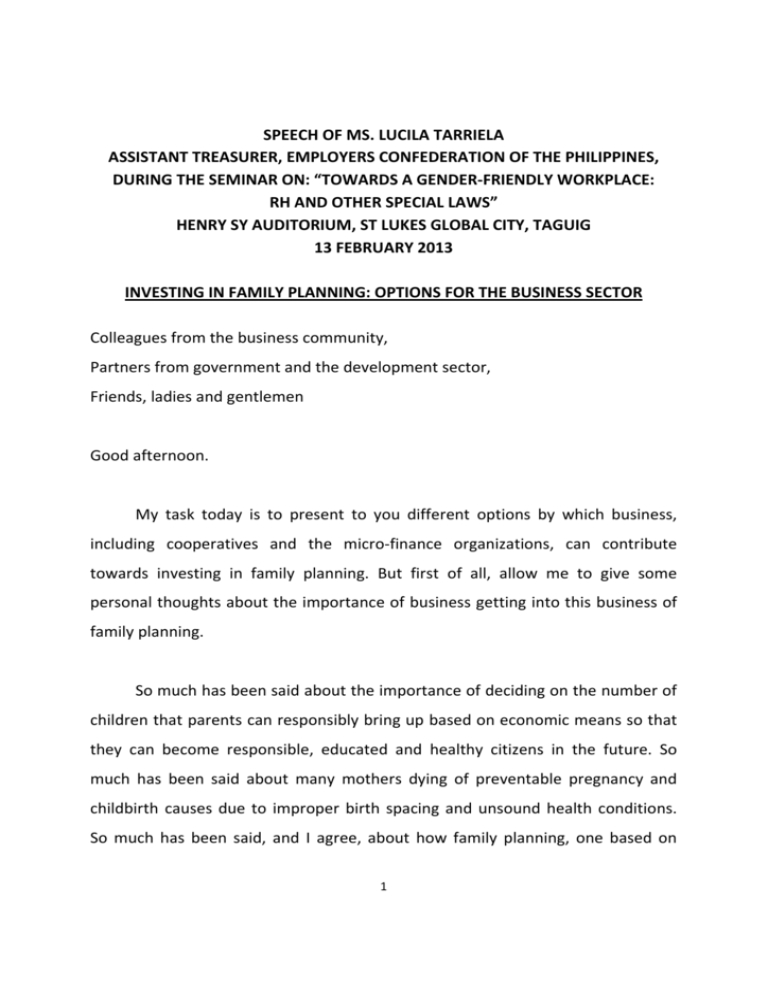
SPEECH OF MS. LUCILA TARRIELA ASSISTANT TREASURER, EMPLOYERS CONFEDERATION OF THE PHILIPPINES, DURING THE SEMINAR ON: “TOWARDS A GENDER‐FRIENDLY WORKPLACE: RH AND OTHER SPECIAL LAWS” HENRY SY AUDITORIUM, ST LUKES GLOBAL CITY, TAGUIG 13 FEBRUARY 2013 INVESTING IN FAMILY PLANNING: OPTIONS FOR THE BUSINESS SECTOR Colleagues from the business community, Partners from government and the development sector, Friends, ladies and gentlemen Good afternoon. My task today is to present to you different options by which business, including cooperatives and the micro‐finance organizations, can contribute towards investing in family planning. But first of all, allow me to give some personal thoughts about the importance of business getting into this business of family planning. So much has been said about the importance of deciding on the number of children that parents can responsibly bring up based on economic means so that they can become responsible, educated and healthy citizens in the future. So much has been said about many mothers dying of preventable pregnancy and childbirth causes due to improper birth spacing and unsound health conditions. So much has been said, and I agree, about how family planning, one based on 1 informed choice, is able to help couples decide on the number and spacing of their children and, thus give to the country a citizenry that is ready to actively participate in nation‐building. Family health is a unique area where compassion, altruism and economics combine in a single cause. By ensuring good health and well‐being of family members, we not only do something morally right but also help build more prosperous, productive communities. Women who are health literate and can access the health care they need to give birth safely – and ensure their babies get a healthy start in life – create the preconditions for economic growth and prosperity. It is government’s duty to ensure that these critical social services are provided. However, countries working alone, or with development partners, cannot do everything required to make this possible. They urgently need the support of private sector, with its scale, energy, efficiency and influence, to provide these services starting with their employees, and eventually moving out to reach communities and the population at large. That is why we are gathered here today to find ways of creating a shared value for our businesses to survive, for our workers and their families to have a healthy and decent quality of life, and for the country to move forward in its quest for inclusive economic growth and development. 2 And how can the business sector play its role? The first one, and perhaps the closest to the heart of many of us here, is instituting family planning as a Corporate Social Responsibility (or CSR) initiative. Also called corporate conscience, corporate citizenship, social performance, or sustainable responsible business, CSR is an opportunity for business to directly contribute towards addressing a priority development goal. Over the years, the Employers Confederation of the Philippines (ECOP) has taken the lead role in the promotion of corporate social responsibility as an integral part of business strategy. ECOP spearheads the implementation of projects and programs that encourage our member companies to raise the bar of their compliance to existing labor and environmental laws taking into consideration the dynamics of their relationship with stakeholders, their corporate priorities, and financial capabilities. The second venue for investment is bringing family planning in the workplace. Over the years, the Employers Confederation of the Philippines has been championing employers’ initiatives on workplace programs that focus on population management and reproductive health, including family planning. In 2005, we launched the ECOP WORKS (or Workplace‐Oriented Reproductive Health Knowledge and Services) Program. Through this project, we implemented reproductive health care education and information, including direct services, to 3 selected companies with the end in view of mainstreaming reproductive health care, not only for women but for men as well, and using the workplace as a venue to reach out to as many Filipinos as possible. Part of this program is the recognition of various companies for their Reproductive Health and Family Planning policies and programs. In Nasugbu, Batangas, the Central Azucarera de Don Pedro, Inc. gathered health volunteers also called “kaugnays” from among the employees and trained them to handle the education, counselling and mentoring of women and couples. The company and its foundation arm are allocating funds for the production of IEC materials and capability building, and have provided regular appropriation for contraceptives as part of the workers’ medical benefits. The program has caught the attention of the provincial government of Batangas, and has now recognized it as a model for replication throughout the province. The third option is family planning as a core business or as a social enterprise. The most obvious way in which companies can create shared value on family planning is through product and service innovation based on the company’s core competencies and comparative advantage. Through self‐ assessment of its competencies, companies may develop new products and services that bridge the gap between what clients want and what the market offers. Our friends from the pharmaceutical sector know this, and I will not be surprised to see new and more effective yet affordable family planning commodities coming into the market soon. And it does not even have to be for profit. Many of our colleagues from the cooperatives have long been engaged in social enterprises where incomes are flowed back for expansion of services. 4 These are just three of the possible modes of private sector engagement in the business of family planning. Whatever the choice, the bottom line is that companies tap into family planning as a way to promote better business productivity, enhance worker productivity, and improve community development. It’s good for business, it’s good for the workers, it’s good for the community, and it’s good for the country. Thank you and good afternoon. 5

